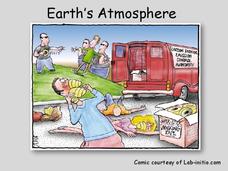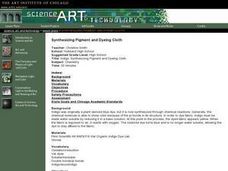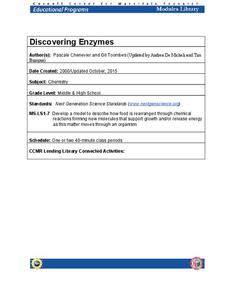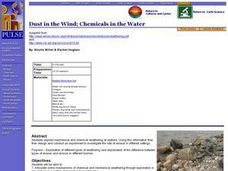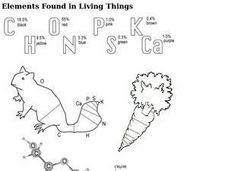Science Geek
Earth's Atmosphere
Ozone gas absorbs the harmful UV-B rays and helps protect humans. An informative presentation begins with the layers of the earth's atmosphere, the pressure and temperature in each of the layers, the ozone layer, the ozone cycle, and the...
Virginia Department of Education
Charles’ Law
Searching for a relatively interesting way to demonstrate Charles' Law? Here is a instructional activity in which pupils heat air inside a flask and then cool the flask to quickly cool the air. They make observations about what occurs...
Curated OER
Using Ion Exchange Chromatography to Separate Proteins
Students explore protein purification by separating a positively charged molecule, lysozyme, from a negatively charged molecule, albumin, at neutral pH using ion exchange chromatography.
Curated OER
Synthesizing Pigment and Dyeing Cloth
Students create a synthetic dye and oxidize the dye and record the effects.
National Institute of Open Schooling
Biomolecules
An informative lesson has learners read about, discuss, and study the classification, structure and importance of the following biomolecules: carbohydrates, proteins, lipids, nucleic acids, and enzymes.
Curated OER
Isomer
In this isomer worksheet, students use molecular model kits to build isomers. Students work in groups and draw and name the isomers they build. They answer 9 questions about both geometric and structural isomers.
Curated OER
The Physical Behavior of Matter
Students distinguish between three phases of matter: solid, liquid and gas, on the molecular level. They compare and predict the relative compressibility of the three phases of matter through journal writings and drawings.
Curated OER
First Land Plants Found on Earth
In this first land plants worksheet, students read about the major events that allowed plants to evolve on Earth. Students read about the primary and secondary atmospheres, the formation of the ozone layer to protect from UV light and...
Curated OER
Desalination: Creating a Solar Still
To better understand how solar power can aid in creating desalinated drinking water, the class creates a model still. They will build a model of a solar still, make observations, and discuss how the process works. While the idea behind...
Curated OER
Thermoset Polymers
Students complete a lab activity with polymers to allow them to better understand how to make "observations". In this science lesson students make measurements and collect data.
Curated OER
Lesson on Proteins
Students examine the importance of proteins including their function and structure. In this protein lesson students play a game to help them better understand proteins.
Texas State Energy Conservation Office
Investigation: Chemical Models
Science teams make models of four different hydrocarbon compounds that we commonly use for fuel. Then they demonstrate chemical reactions that result when energy is produced. This can be used as an enrichment when your class is studying...
Cornell University
Bacteria Take Over and Down
Bacteria outnumber all other forms of life on Earth. Scholars observe the growth of bacteria in petri dishes to understand their role in maintaining good health. Then, they observe the growth of bacteria after they introduce...
Curated OER
In Touch with Apples
Students read "How To Make an Apple Pie and See the World", the story of a girl who traveled the world to find the ingredients to make her apple pie. They conduct a series of interdisciplinary activities including testing their senses,...
Curated OER
Dilution and Concentration of Solutions
Future chemists practice laboratory techniques by creating a monochloramine solution. The objectives are to use of dilution, 9concentration, and measurement skills and to prepare a solution that will be used in a water treatment...
Curated OER
Semipermeable Membranes and Bioaccumulation
Beginning biologists place a drop of food coloring into water of differing temperatures to observe the effect on the diffusion rate. They remove the shells from raw eggs and then experiment with osmosis over the remaining membranes....
Chicago Botanic Garden
Carbon, Greenhouse Gases, and Climate
Climate models mathematically represent the interactions of the atmosphere, oceans, land, sun, surface, and ice. Part two in the series of four lessons looks at the role greenhouse gases play in keeping Earth warm and has participants...
Chicago Botanic Garden
Climate and Forest Ecosystem Services
Forests, through sequestration, capture excess carbon dioxide in our atmosphere and store it, aiding in climate change. The third installment in a four-part series on how climate impacts forests explores carbon sequestration. Classes...
Cornell University
Discovering Enzymes
Explore the function of enzymes through a series of lab investigations. Learners use household enzymes such as hydrogen peroxide to model the role of enzymes. The enzymes break down proteins with and without a catalyst.
Curated OER
The Importance of Carbon
This carbon PowerPoint shows the bonds formed by Carbon and lists the different attachments that replace the atoms to change the properties and function.
Curated OER
Lipid Worksheet
In this lipid worksheet, students answer questions about the structure and functions of lipids. They read about the three main lipids in the body including triglycerides, phospholipids and cholesterol and answer questions about each.
Curated OER
Dust in the Wind; Chemicals in the Water
Students explore mechanical and chemical weathering at stations. They articulate some mechanisms of chemical and mechanical weathering through exploration in a lab. Students stations describe how chemical weathering differs from...
Curated OER
A Fine Mess
In this enthalpy and entropy worksheet, students read about the differences between enthalpy and entropy and answer three critical thinking questions about the reading.
Curated OER
Elements Found in Living Things
In this elements worksheet, students review the most common elements found in living things. Students color in two pictures with the percentages of the elements found in that living thing.


